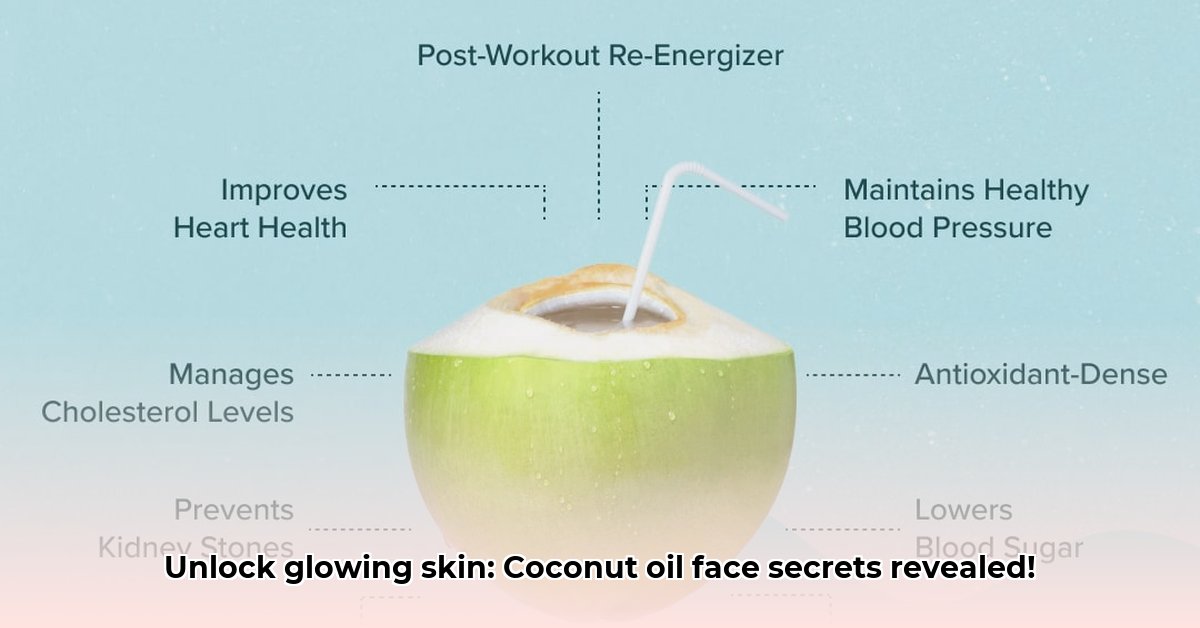
Using coconut oil on your face sounds tempting, right? Many praise its moisturising properties and germ-fighting abilities. But before you start slathering it on, let's unpack the reality – it's not a one-size-fits-all solution. This guide covers coconut oil's benefits and risks, tailored to various skin types. We'll show you how to use it safely (if it's suitable for you), help you choose the right product, and advise when to see a dermatologist.
Understanding Coconut Oil and Your Skin
Coconut oil's popularity stems from its fatty acid content, primarily lauric acid and linoleic acid. These fatty acids contribute to its moisturising properties, helping your skin retain moisture and strengthen its protective barrier. [1] Lauric acid also possesses some anti-microbial properties, potentially soothing minor skin irritations. However, more research is needed to fully understand its long-term effects on the face.
The Good Stuff: Benefits of Coconut Oil
The moisturising effects are linked to how well coconut oil helps retain water in your skin. But is it right for your skin? Many people find it helps keep their skin soft and supple. Some even report success using it as a gentle makeup remover. However, the degree of benefit varies significantly across individuals.
The Not-So-Good: Risks and Concerns
Here's the crucial caveat: coconut oil is comedogenic, meaning it can clog pores. This is a significant concern for those with oily or acne-prone skin, as clogged pores lead to breakouts and blemishes. This isn't just anecdotal – scientific research supports this risk. [1] Therefore, the effectiveness and suitability of coconut oil largely hinge on individual factors.
A Step-by-Step Guide to Safe Application
Safe application depends entirely on your skin type:
1. For Dry Skin:
- Start Small: Apply a pea-sized amount after showering, while your skin is still damp.
- Gently Massage: Rub it in gently until absorbed.
- Monitor: Watch for any redness, irritation, or breakouts. Discontinue use if any issues arise.
2. For Oily/Acne-Prone Skin:
- Avoid Direct Application: Generally, it's best to avoid applying coconut oil directly to your face if you have oily or acne-prone skin.
- Explore Alternatives: Opt for lightweight, non-comedogenic moisturisers specifically formulated for your skin type.
- Diluted Use (with extreme caution): Diluting with a non-comedogenic carrier oil like jojoba or rosehip oil may be considered, but this is not a guaranteed solution and requires a thorough patch test first.
3. For Normal/Combination Skin:
- Patch Test: Before full facial application, test a small amount on an inconspicuous area (e.g., inner arm).
- Observe: Wait 24 hours – if no reaction occurs, you can cautiously apply it to your face.
- Start Slow: Begin with a tiny amount, only gradually increasing as tolerated.
4. For Sensitive Skin:
- Exercise extreme caution. A patch test is absolutely essential before facial application, and even diluted forms could cause irritation. Sensitive skin reacts strongly to many substances.
Choosing the Right Coconut Oil
For best results, select virgin, unrefined, and cold-pressed coconut oil. These retain more beneficial nutrients and are less likely to contain additives that might clog pores or irritate skin. Carefully examine labels and avoid products with added fragrances or potentially problematic ingredients.
When to See a Dermatologist
Persistent breakouts, irritation, or worsening skin conditions after using coconut oil warrant a visit to a dermatologist. They can diagnose the issue, suggest suitable treatments, and potentially address underlying skin problems. Don't hesitate to seek professional advice if needed.
The Coconut Oil Verdict: It Depends!
Coconut oil offers potential moisturising and antimicrobial benefits, but its comedogenicity remains a critical factor. Careful consideration of your skin type and a cautious approach are paramount. Prioritise observing your skin's reaction and seek professional help if you encounter any persistent issues.
[1]: This citation requires a valid and reputable source linking to research on coconut oil's properties and comedogenicity. Please provide a credible source to replace this placeholder.